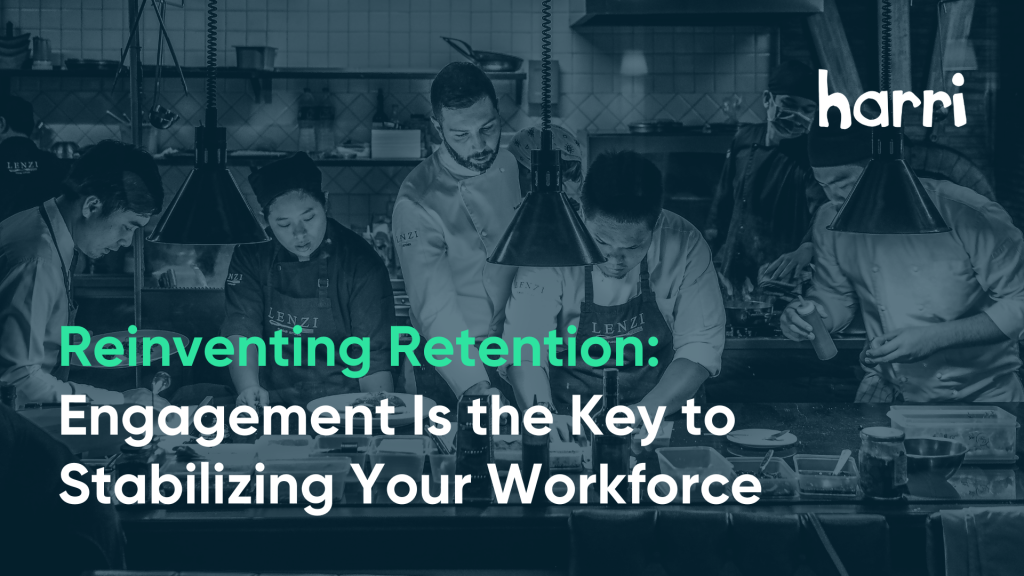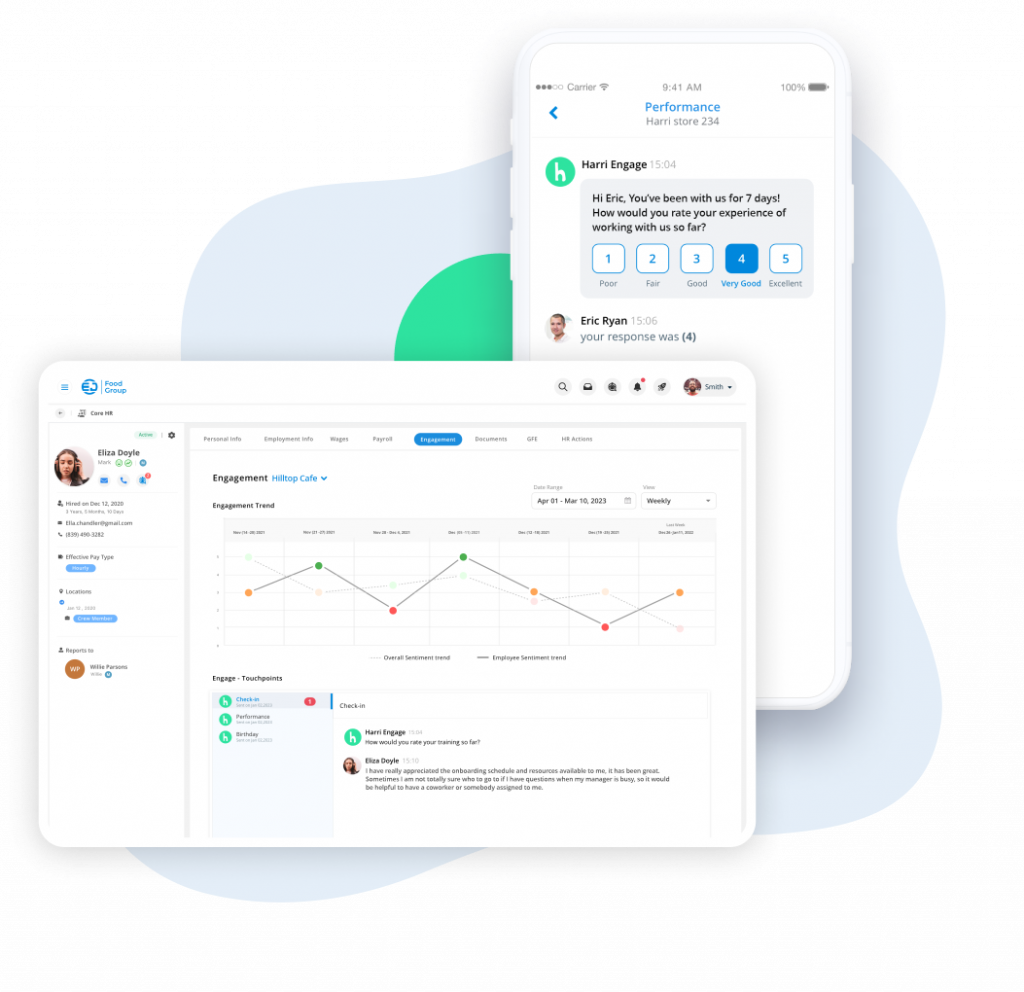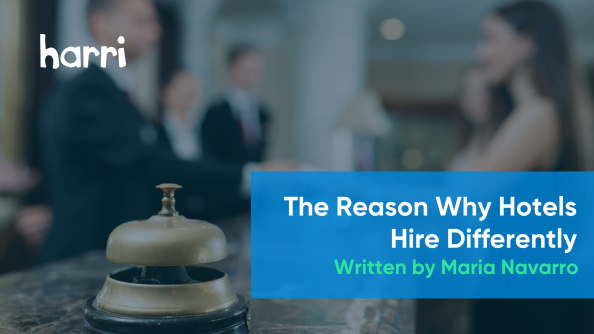Reinventing Retention: Why Engagement, Not Hiring, Is the Key to Stabilizing Your Workforce

- By Harri Insider Team | November 9, 2023
Turnover in the hospitality industry is often accepted as part of the business, a given rather than an exception. But behind the accepted norm lies a significant impact on the business’s health and customer experience. In the service-led sectors, the numbers are telling—a turnover rate that averages 73%, with quick-service restaurants reaching even more alarming figures. It’s a trend that comes at a high price, not just in the direct costs of hiring and training but in the subtler, more damaging costs of lost knowledge and disrupted team dynamics.
For years, the industry’s reflex has been to plug gaps in the workforce with a steady stream of new hires, a strategy akin to patching a leak without fixing the pipes. The Frontline Worker Report indicates that 7 in 10 talent leaders now view hiring as an operational priority, not just a recruitment one, emphasizing the operational impact of high turnover rates. The reality, reflected in the data, shows that this approach is short-sighted. Nearly half of all frontline workers leave their positions within the first 90 days, and with each departure, there’s a ripple effect that extends to labor costs, operational efficiency, and ultimately, the bottom line.

The Engagement Imperative
Leading hospitality brands are distinguishing themselves in the market by emphasizing employee engagement. They are adopting tools and technologies tailored to the modern workforce, leveraging mobile devices as platforms for authentic interaction. Industry data supports a strong link between the availability of these tools and increased employee satisfaction, pointing to a clear direction for enhancing staff retention. Moreover, given the high cost of replacing an employee—often running into thousands of dollars—maintaining proactive communication with staff is essential.
Bridging Engagement with Predictive Insight
The next frontier in workforce management is the strategic application of predictive analytics. Beyond reacting to employee feedback, anticipating their needs through pattern analysis signifies a transformative leap for the industry. With 42% of hospitality workers contemplating a shift away from the industry, the urgency to adopt predictive analytics intensifies. By analyzing patterns in employee behavior and satisfaction, companies can now pinpoint which employees might be considering leaving. This data-driven insight allows for a proactive approach, where intervention strategies are personalized and timely. It means managers can offer targeted support to individuals, addressing their unique concerns and motivations before they become resignation letters.
Implementing Engagement Tools
The implementation of engagement tools into daily operations is an essential step towards retention. It’s critical to arm your admins with the ability to set up flexible touchpoints that leverage intelligent automation to optimize engagement. Then, by connecting with your employees in a meaningful way to enhance their experience, you will also be able to equip your managers and operators with valuable data and feedback to drive meaningful improvements.
Most importantly, the engagement tool you choose should integrate seamlessly with your existing tools and meet your employees where they are. Consider the routine actions your staff perform, such as clocking in or reviewing their schedules—these moments present prime opportunities for engagement. Capitalizing on these interactions to solicit feedback can forge stronger connections and yield valuable insights.
Beyond mere integration, your engagement tool must be an intuitive extension of an employee’s daily routine, functioning on the very devices that are already part of their work-life fabric. It should make the act of giving feedback as natural and straightforward as interacting on a familiar app. By embedding these tools into the habitual workflow—where checking schedules and swapping shifts occurs—employees are more likely to engage regularly. This habitual use fosters a genuine, ongoing conversation, essential for a thriving engagement culture.

Maximizing Potential: Getting the Most from Your Employees
The right engagement tool does more than just reduce turnover; it transforms employees into proactive stakeholders of the customer experience. When employees feel listened to and valued, they’re not only more likely to stay but also to take greater ownership of their roles. Engaged employees are the ones who go the extra mile to ensure customers leave with a smile, becoming brand ambassadors who elevate the service standard.
An effective engagement platform offers a forward-looking view, enabling managers to identify not just current but future employee needs and concerns. This foresight leads to preemptive problem-solving, ensuring that employees feel supported and valued ahead of time. As a result, they become more invested in their work, leading to a noticeable increase in their contribution to the brand’s mission and customer satisfaction.
When staff take more ownership, they’re not just working for a paycheck—they’re working towards a shared vision of excellence. This sense of purpose is infectious, often spreading to new hires who quickly pick up on the culture of engagement and responsibility. The end result is a robust, committed workforce that not only stays longer but also delivers a consistently high-quality customer experience.
The Proven Impact of Employee Engagement on Retention and Customer Loyalty
When engagement is prioritized, the results are twofold: employees stay longer, and their satisfaction permeates the workplace. A stable workforce means a consistent customer experience, where patrons interact with familiar faces and build a rapport with the staff. This familiarity breeds loyalty, not just among employees but also customers, leading to a healthier bottom line.
The tangible benefits of effective employee engagement extend beyond retention statistics. A strategic investment in optimizing engagement is a commitment to the enduring prosperity of your brands. This approach yields comprehensive advantages, enhancing team dynamics and elevating the customer experience. Hospitality brands that adopt and implement robust engagement strategies position themselves at the forefront of industry standards, not only mitigating staff turnover but also fostering a workplace conducive to exceptional customer service and, thus, enhanced profitability.
Boost profitability by curbing turnover with Harri Engage. Explore the solution that aligns employee satisfaction with your bottom line.





















